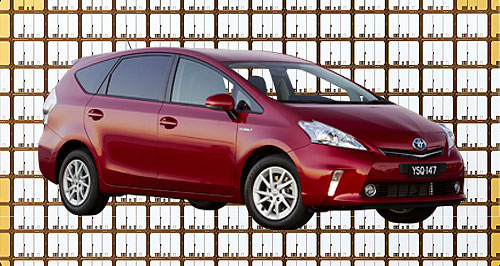Make / Model Search
News - ToyotaToyota chips in with hybrid fuel savingsHard one: Toyota says it can cut the size of its hybrid vehicle power control units by 80 per cent and thus improve fuel economy, thanks to experimental silicon carbide chips. Super-hard silicon chips promise 10 per cent fuel cuts in Toyota hybrid cars21 May 2014 TOYOTA hopes to cut hybrid vehicle fuel consumption by up to 10 per cent by introducing diamond-like silicon carbide (SiC) emiconductors in power control units for cars such as its Prius by 2020. Test cars running the units developed jointly by Toyota and automotive electrical supplier Denso have already shown a five per cent improvement, but the Japanese giant believes more savings are possible. Compared with convention silicon chips, semiconductors made from silicon carbide – said to be second in hardness only to diamonds – reduce the resistance of electrical current and allow for efficient current flow at higher frequencies. Toyota says this allows the engineers to reduce the size of the coil and capacitor in the hybrid vehicle power control unit (PCU) by 80 per cent. In current hybrid vehicles, the PCU accounts for 25 per cent of total electrical power loss, with 20 per cent of that coming from the semiconductors. Under Australia’s official fuel consumption test, the Prius consumes 3.7 litres of fuel per 100km on the combined cycle. A 10 per cent saving would drop that to below 3.4L/100km. The company said in a statement released in Japan that Toyota Central Research and Development Lab and Denso had begun collaborating on basic research on silicon carbide semi-conductors in the 1980s. Toyota’s automotive engineers had become involved in 2007 to help develop the units for practical use. “Toyota has installed the jointly developed SiC power semiconductors in PCUs for prototype HVs (hybrid vehicles), and test driving on test courses has confirmed a fuel efficiency increase exceeding five per cent under the JC08 test cycle,” he said. “In December last year, Toyota established a clean room for dedicated development of SiC semiconductors at its Hirose Plant, which is a facility for research, development and production of devices such as electronic controllers and semiconductors.” Toyota said it hoped to start testing the new units on public roads within a year. “In addition to improved engine and aerodynamic performance, Toyota is positioning high efficiency power semiconductors as a key technology for improving fuel efficiency for HVs and other vehicles with electrified powertrains,” the company said. “Going forward, Toyota will continue to boost development activities aimed at early implementation of SiC power semiconductors.” Toyota said it aimed to commercialise the technology by 2020.  Read more |
Click to shareToyota articlesResearch Toyota Motor industry news |











Facebook Twitter Instagram